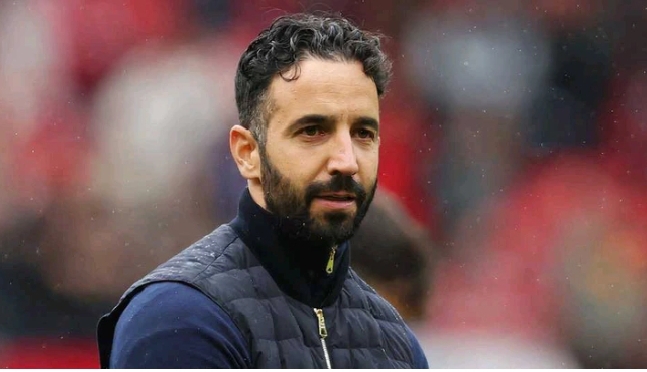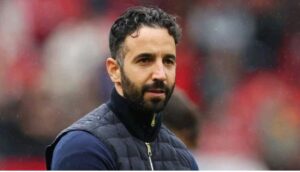United Board Prepare for Change as Amorim Given Final Three‑Game Test
Manchester United’s board find themselves at a crossroads. Manager Rúben Amorim, installed amid high hopes, now stands under intense scrutiny. According to multiple reports and growing speculation, his job is not guaranteed beyond the next three games — a final test period that could determine whether he stays or United begin looking for a replacement.
This article examines why this “three‑game test” has come about, what the pressure points are, who might replace Amorim, what matches he must win (or at least perform in) to save his skin, and what the broader implications could be.
—
What Led to This Moment
Several factors have conspired to put Amorim on the ropes:
1. Poor Early Season Results
Manchester United have had a disappointing start to the current campaign. A string of underwhelming performances in the Premier League — including heavy defeats, lacklustre displays against supposedly weaker sides, and leakage of goals — have frustrated fans, pundits, and the board alike. The pressure has not just come from results, but from how those results have come about. There are concerns over lack of cohesion, unconvincing attacking play, defensive lapses, and failure to adapt tactically.
2. Culture and Mentality Issues
Amorim himself has admitted that part of United’s problem is mentality: a lack of urgency, an acceptance of poor results, and a diminished sense of “being Manchester United.” There have been comments about losing the feeling of what it means to suffer a home defeat, and concerns that players are not reacting with the required intensity in big moments.
3. Board Expectations and Financial Pressure
United have spent significantly in the recent window(s), and with co‑owners like Sir Jim Ratcliffe playing a more hands‑on role in football operations, the tolerance for mediocrity is lower. Commercial and financial pressures raise the stakes. The club must perform, both on and off the pitch. Poor league position means reduced revenue potential (broadcasting, sponsorship, matchday) and potential failure to qualify for European competitions magnifies that. United have also seen financial results with record revenues but still losses, increasing scrutiny.
4. Fan Discontent & Media Rumours
As losses mount and expectations aren’t met, fans are growing frustrated. Pundits, ex-players, and media outlets are increasingly calling out poor decision‑making: in player recruitment, in tactics, in starting lineups. There are stories about player dissatisfaction with Amorim’s tactics (especially his 3‑4‑3 system), concerns about misuse of certain players, and whether Amorim has the right personnel for his style.
All of this has built to a point where the board apparently feels that Amorim’s future hinges on immediate results. The next three fixtures are being viewed as a critical measure of his capacity to turn things around.
—
The “Final Three Games” Test: What It Means
Giving a manager a “three‐game test” isn’t uncommon in modern football; it’s a way for the board to say, essentially: show improvement now, or decisions will be made. For Amorim, this means:
Immediate performance improvements: Not just winning, but winning convincingly, showing better defensive organisation, attacking coherence, mental sharpness.
Tactical flexibility: There’s pressure for him to show adaptability — changing formation/tactics if needed, making better substitutions, using the squad more wisely.
Player response: Key players need to step up. There’s talk of some dressing‑room malaise; if senior players don’t perform, it reflects badly on the manager.
Public vs Private impact: The board will be watching not only match outcomes, but how Amorim handles the pressure publicly, how he motivates the squad, and how he addresses criticism.
—
Which Matches Are Likely Part of the “Test”
While I can’t confirm for certain which three games the board have in mind, media reports have flagged upcoming fixtures that are seen as pivotal. Based on recent published articles:
United face a match against Chelsea (soon after the Derby defeat to Man City), seen as a major litmus test. A positive result here is vital.
Other games against mid‑table or slightly lower teams (like Brentford or others) where United are expected to dominate, must be won. Dropping points in “must-win” matches deepens concern.
Perhaps another big fixture or derby, or a match against a top 6 opponent. The board will use such games to see how the team behaves under pressure. Beating or performing well against strong opposition would give some breathing room.
If United don’t manage a win (or two) plus evidence of improved performance across these games, the board may move to consider alternatives.
—
Who Might Replace Amorim
Rumours are already swirling about potential replacements should this test period end without signs of improvement:
Michael Carrick is being mentioned in several reports as a “common sense” internal or former club choice. He has history at United, understands the culture, and is seen by some as someone who could steady the ship.
Other names are floating, though less strongly. Some pundits suggest that high‑profile managers with Premier League credentials could be approached. But replacing a manager mid‑season always comes with complications.
Importantly, any replacement would have to be someone who can command respect, adapt quickly, and potentially accept constraints (squad limitations, transfer windows, etc.). It’s not clear the board would make a rash appointment — likely someone vetted, possibly internal or with links to the club.
—
Amorim’s Position & What He’s Said
Some of Amorim’s own comments give insight into how aware he is of the threat to his job:
He has publicly acknowledged loss of urgency, culture problems, and that United no longer feel like the fearsome club they should be (“feeling that it’s OK” to lose, etc.). These kinds of statements usually come when a manager senses that support is waning.
He also admitted that if the club continues underperforming, change may be necessary — not just in players but potentially in leadership.
Despite this, he has defended his principles: sticking with his preferred formation (3‑4‑3), defending that it brings control and identity even if the results haven’t matched fan expectations so far.
All this adds up to someone trying to balance accountability, self‑awareness, and defence of his own approach. Whether that is enough given the board’s expectations remains the question.
—
What Happens If Amorim Fails the Test
If the next three games don’t show positive signs, the likely outcomes include:
Managerial change: The board could sack Amorim, possibly replacing him with someone like Carrick (as rumors suggest), or an external manager.
Shifts in transfer strategy / squad rotation: Even if they don’t sack him, the club may make more immediate changes: dropping underperforming players, changing tactical setups, bringing in different profiles of players in next window, etc.
Increase in pressure on players: If Amorim stays, he may need to exert more control, demanding higher standards from senior players, possibly changing leadership structure in the dressing room.
Fan backlash or relief: Fans will be watching closely. A loss or poor performance could lead to loud protests. Conversely, even a gritty win could buy Amorim more time, perhaps easing criticism.
—
Broader Implications for United
This moment is more than just about one manager. What unfolds in the next few games will send signals about:
How United’s board handles failure: Whether patience is in short supply; how much weight is given to long‑term planning vs short‑term results.
Club identity: Whether United continue to push an ambitious style under Amorim, or whether they retreat into more conservative, pragmatic approaches if replacements can’t be found who align with Amorim’s vision.
Player morale and recruitment: If changes are imminent, how stable is the environment for current and potential future players? Recruiting top talent demands that they believe in stability and vision.
Fan trust: United supporters expect success, resilience, and honesty. If the board fails to act decisively, or if changes are made but not properly communicated, faith could erode further.
—
Verdict: Can Amorim Pass the Test?
It’s a high‑pressure moment. Amorim has in his favour:
Past credentials: Success at Sporting, reputation, some impressive performances.
Board support (so far): There is evidence that the board still believe in his project, at least to a point. They’ve invested in players, and co‑owners like Ratcliffe have shown engagement.
Opportunity for quick wins: Matches like Chelsea, matches against mid‑table sides, are winnable; strong performances could shift narrative quickly.
But against him:
He still needs to show consistency. Perceptions are that while there are glimpses, performances have been erratic.
Some players appear not fully on board with his style, or not suited to his tactical preferences.
The margin for error is shrinking: three games is a short time window. If mistakes like defensive lapses, failure to convert chances persist, no one will wait much longer.
—
What Fans Should Watch For
If you follow United, these are the signs to pay attention to over the next few matches:
Changes in starting XI: Are senior underperformers being dropped? Is there rotation that suggests tactical flexibility?
Performance vs Strong Opponents: United need to show they can compete in big games; even if they lose, losing narrowly with fight is different from being outclassed.
Mentality & urgency: Look for signs players care — pressing, tracking back, reacting to conceding first, fighting for points especially when games are not going United’s way.
Post‑match interviews & body language: How Amorim, players, and board members talk will give clues—defensive tone, admission of mistakes, promises of change etc.
Board signals: Are there signs of internal changes? Rumours of candidates, technical staff shifts, scouting movements all suggest management preparing for change.
—
In conclusion, the next three games may not just define Amorim’s short‑term future — they could define whether this tenure at Old Trafford is regarded as a project with potential or a damaging misstep. For the board, for the fans, for the players, it’s a final stretch to see whether belief becomes reality, or whether the belief needs to be replaced. United are preparing for change — whether that change involves a manager, a system, or both — and the pressure has never been higher.












Leave a Reply